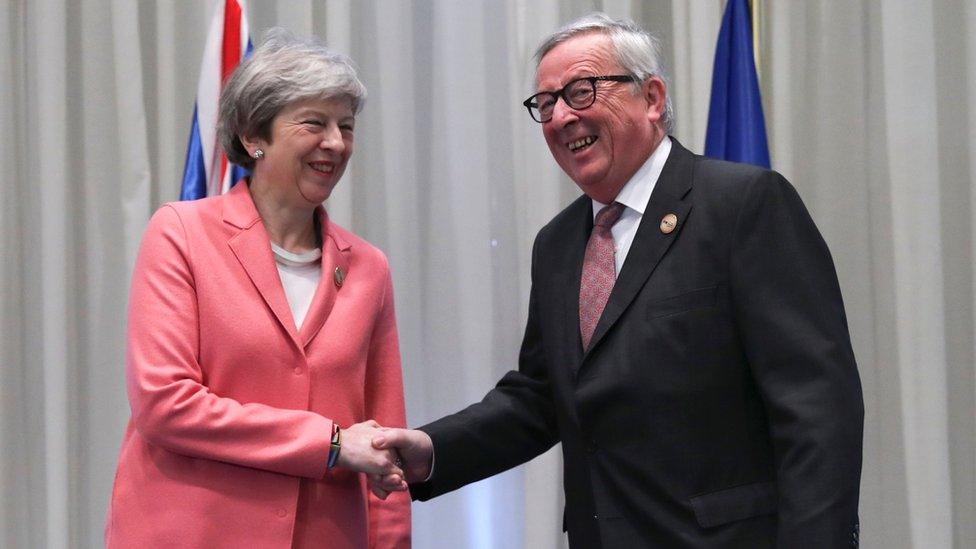EU asks what next for Brexit after May goes
- Published

Mr Juncker said he would "equally respect and establish working relations with any new Prime Minister."
The EU response to Theresa May's resignation speech was immediate.
From across Europe came expressions of respect - though notably, not regret.
The Brexit process is a painful one for the EU - a constant reminder that the bloc is failing to keep a key member state, a constant shadow over other EU business and an economic drain - provoked by all the uncertainty - on European companies and outside investment.
As UK prime minister, Theresa May became associated with all that negativity.
It was a source of continuous frustration in Brussels that she - in EU leaders' opinion - repeatedly pandered to the extreme Brexiteers in her party, rather than face the inevitability of compromise and the necessity of cross-party co-operation (which Brussels believes finally came too late) to get an exit deal agreed.
European politicians and diplomats have always said to me: "What we (the EU) need, is a British prime minister strong enough to be able to do a deal in Brussels and to sell it back home in Westminster, whoever they may be."
Theresa May never was that prime minister.
Today the president of the European Commission, Jean Claude Juncker, described her as "a woman of courage for whom he has great respect" but he also made clear, as did other European leaders, that finishing the Brexit process was the EU's primary concern.
Mr Juncker declared he would "equally respect and establish working relations with any new prime minister whoever they may be".
Adding those last four words "whoever they may be", alludes to the EU fear that Boris Johnson or another arch Brexiteer is most likely to become Mrs May's successor.
The EU has prepared for the prospect of "Prime Minister Boris" for months now. Theresa May's demise doesn't exactly come as a surprise.
As was the case when Donald Trump became US president, many Europeans have wondered whether "populist Boris, the arch Brexiteer" might be tamed by office into becoming calmer and (from the European perspective) more reasonable.
The worry here is that Mr Johnson, or another Brexiteer, keen to prove their mettle, will want to play to the gallery at home: obstructing EU business where they can, as long as the UK remains a reluctant member.
The EU has already taken legal advice on how to get around that potential problem.
They have concluded, for example, that if the new UK prime minister held up the next EU budget, which needs to be decided in the coming months, the 27 EU leaders minus the UK could informally sign the budget off. Their decision would then become legally binding once the UK officially left the EU.
All the speculation about post-May Britain has also got EU leaders thinking about whether to grant the UK a new Brexit extension. The current one runs out on 31 October.
The EU assumption is that the new UK prime minister will want more time to hold a general election or to try to renegotiate the current Brexit deal, particularly the controversial backstop guarantee for the Irish border. Good luck with that one, says Brussels, though Dublin will worry that the resolve of some EU leaders may falter if faced with the real prospect (this time) of a no-deal Brexit.
With all this in mind, a number of EU countries, notably France, think it probably best to close the door sooner rather than later, to a country that is leaving anyway. President Macron worries that the longer the UK stays reluctantly, the more it might poison the general EU atmosphere.
Germany, however, would prefer to give the UK more time, if not to change its mind about Brexit, then at least to ensure an "orderly exit" - ie Brexit with a deal - to avoid the economic and political fallout of no deal at all.
But 31 October is still a long way away in political terms.
Right now, EU leaders are far more preoccupied with this week's elections for the European parliament. The result promises to have a profound impact on the national governments of a fair few countries, including the EU's Big Two, Germany and France.
- Published29 April 2019
- Published22 May 2019
- Published24 May 2019

